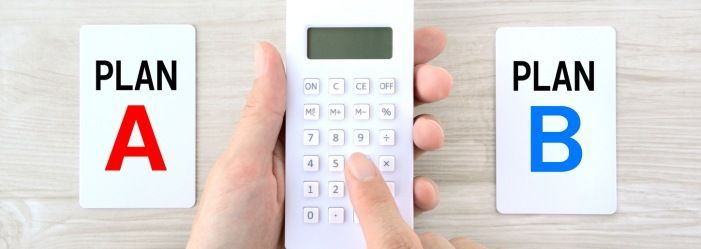Last Updated: December 08, 2023
Each one comes with benefits and risks

Debt is divided into two major categories - unsecured and secured - and the difference between unsecured and secured loans is very important. Each one comes with benefits and risks. If you understand what the terms mean, you can better determine which one to select when applying for debt and which one to pay off first.
What is Secured Debt?
Secured debt is secured by an asset. The two most common types of secured debt are mortgages and car loans. If you fail to repay your secured loan, you may lose the asset that is attached to it. If your collateral/asset is seized, it will be sold at auction and the proceeds used to repay your debt. If the debt is not paid in full, the lender can sue for the difference.
Secured debt often has better loan terms because there is something that the lender can seize. This includes interest rates. You do not own the item until the loan is paid in full.
The one type of secured loan you should never apply for is a car title loan. The interest rates are extremely high and you stand a very good chance of losing your vehicle due to non-payment.
What is Unsecured Debt?
Unsecured debt has no assets or property put up as collateral to guarantee repayment of the debt. Since it poses more risk for lenders not having that backup collateral, eligibility requirements tend to be stricter and interest rates higher compared to secured debt.
Common types of unsecured debt include:
- Credit cards
- Medical bills
- Personal loans
- Payday loans
- Utility bills
- Most student loans
With unsecured debt like credit cards or personal loans, the lender evaluates your creditworthiness, income, and other credentials to determine if you qualify and what terms you'll receive. They have no claim to your assets should you default - they can attempt to collect through settlements or wage garnishments, but can't seize property.
That's why strong credit history, steady employment, and adequate income are common requirements for approval of unsecured financing options. Low credit scores result in denial or very high interest rates.
Unsecured debt can provide accessible financing for those who qualify, but also leaves borrowers more vulnerable financially in cases of job loss or emergencies that make payments unaffordable. Prioritizing paying off high-interest unsecured debts can provide more financial stability.
Which One to Apply For?
The answer to which type of debt to apply for depends on what you are purchasing and what you are willing to risk. If you are making a large purchase, like a car or a house, you are required to take out a secured loan. It is possible to get a secured personal loan to use as you wish. You will get better interest rates and possibly pay fees to qualify for the loan. Just make certain you can repay the loan or can afford to lose the asset that you are using to secure the loan.
Which One to Pay Off First?
Unless you can afford to lose your collateral, always prioritize paying off your secured loan. Losing a house or a car can mean losing your job. This does not mean that you should stop paying on your unsecured loan. Instead, you may need to make smaller payments on those. This does mean that you will pay more over time in interest and fees, but you won't end up homeless (hopefully).
Debt Relief Options
Debt settlement is one path to becoming debt-free, but there are alternatives to consider as well.
Some other popular debt relief choices include:
- Credit Counseling - Nonprofit credit counseling agencies can provide guidance on managing debt through services like debt management plans (DMPs), budgeting help, and financial education. DMPs involve negotiating with creditors to lower interest rates and create an affordable payment plan for paying down debt in full over time. Learn more about credit counseling.
- Debt Consolidation Loans - These loans allow you to roll multiple debts into one new loan with lower monthly payments. This can make payments more manageable, but it extends the repayment timeline. Consolidation loans can be secured (requiring collateral like your home) or unsecured. Read our guide on debt consolidation.
- Bankruptcy - Declaring bankruptcy eliminates or restructures debts you can't reasonably pay off. However, it damages your credit score for years and not all debts can be discharged. Chapter 7 bankruptcy liquidates assets to pay creditors, while Chapter 13 sets up a 3-5 year repayment plan.
No one-size-fits-all solution exists. The right debt relief option depends on your unique financial situation. Speaking with one of our debt specialists can help you understand the pros and cons of different approaches.
How Debt Settlement Works
Debt settlement companies like Pacific Debt negotiate with creditors and collectors to reduce what you owe. The typical program lasts 2-4 years. Once enough is saved to make settlement offers, the process usually takes 6-24 months to resolve all accounts.
We help you save money in a separate account, then make lump sum offers to creditors often between 40-60% of what you owe. If they accept the offer, your account is considered “settled in full.” You pay taxes on the forgiven debt.
Debt settlement allows you to pay back debts at an affordable rate compared to minimum payments, become debt-free faster, and avoid bankruptcy. However, it may damage your credit score in the short term. It also involves falling behind on payments to creditors, which they may perceive negatively.
Debt settlement can be a viable path to freedom from debt, but it has pros and cons to weigh carefully based on your situation.
Work with a Financial Advisor
If you need help with budgeting, dealing with unexpected expenses, or building savings, consider working with a professional financial advisor in addition to a debt specialist like Pacific Debt.
Look for a fee-only advisor who charges by the hour or as a percentage of assets under management. Their incentive is to improve your finances, not earn commissions selling financial products. A certified financial planner (CFP) has met extensive education and ethics requirements.
A financial advisor can offer guidance like:
- Creating a spending plan and tracking expenses
- Planning for large purchases and other financial goals
- Maximizing contributions to retirement plans
- Building an emergency fund
- Evaluating insurance coverage
- Overseeing investments
- Developing tax strategies
Good advisors look at your whole financial picture to put you on solid ground beyond just eliminating debt.
FAQs
Pacific Debt, Inc
If you have unsecured loans like credit cards and medical bills and are having trouble making even minimum payments, you may need professional help. Speak to a credit counselor or contact a
debt settlement specialist. They can give you information on how to get out of debt and help you learn to stay out of debt.
In fact, if you give one of our debt specialists a call, they can explain to you the pros and cons of each and where your unique situation may best fit. If that is not Pacific Debt, Inc., it’s not a problem. We will refer you to a trusted partner who can help you.
Pacific Debt, Inc is an award winning debt settlement company. Debt settlement means that we negotiate on your behalf to decrease the amount you owe on most unsecured debt. Our initial consultation is free, and our debt experts will explain your options to you.
✔ Accredited by Better Business Bureau with BBB A+ rating (4.92 rating and 1,700+ reviews)
✔ 7.5 star rating by BestCompany.com (over 2300+ client reviews)
✔ 4.8 star rating by TrustPilot (over 2200+ verified consumer reviews)
✔ ConsumerAffairs.com Accredited (over 500+ verified reviews with an average rating of 5 stars)
✔ A Top 10 Rated Compan by TopTenReviews.com , ConsumersAdvocate.com and Top10debtconsolidation.com
✔ 4.6 star rating by Google (400+ client reviews)
✔ 100% rating by SuperMoney (8 client reviews)
Reduce Your Credit Card Debt By Up to Half

BBB Reviews | 4.9/5.0 Rating









 Do Not Sell My Personal Information
Do Not Sell My Personal Information